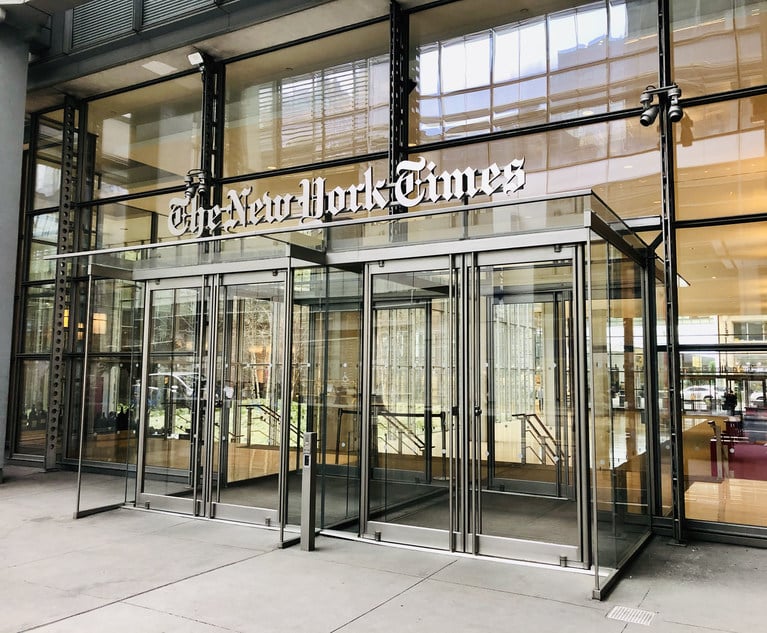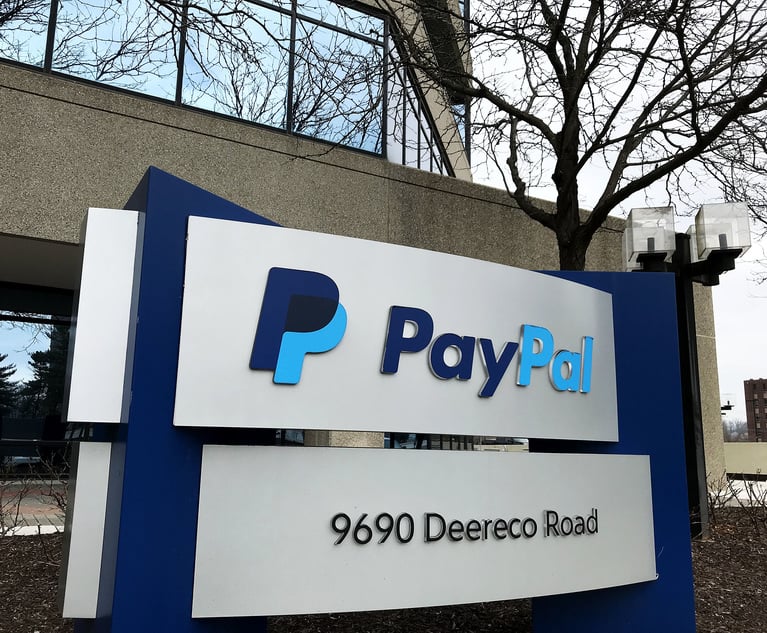Google Hit With Harsh Copyright Ruling From Competition Watchdog in France
The French Competition Authority cited "serious and immediate harm to the press sector" in ordering Google to start negotiating in good faith with news publishers over the use of their content online.
April 10, 2020 at 04:17 PM
4 minute read
The original version of this story was published on Law.com International
France's competition regulator has handed Google a harsh defeat in a copyright dispute with news publishers over the use of their content online without compensation.
Saying that the search giant's actions "caused serious and immediate harm to the press sector," the Competition Authority has ordered Google to start negotiating in good faith immediately to find an accord with the publishers.
The authority said it expected the negotiations to conclude within three months and result in some form of remuneration for the publishers.
The interim decision is a victory for the French national news agency Agence France-Presse and groups representing French magazine and newspaper publishers, whose complaint last November over Google's tactics sparked the decision, which was issued Thursday.
The publishers had argued that in addition to not respecting French copyright laws, Google broke EU competition law by attempting to abuse its market position in online news to get the publishers to agree to let Google use their material for free.
The authority is still deliberating on the EU law question. In the meantime, it has imposed strict monitoring on Google, including monthly progress reports on the negotiations with the publishers, and retroactivity of any fees.
Google did not reply to repeated requests for comment. The company's vice president for news, Richard Gingras, said in a statement that Google would "comply with the order while we review it and continue those negotiations."
The publishers' complaint follows on new EU copyright rules that came into effect last April and were adopted into French law last July.
The new rules grant publishers a "neighboring right" allowing them to negotiate a fee, similar to a royalty, from online platforms for displaying their content. The neighboring right does not guarantee compensation, but it obliges the parties to negotiate in good faith.
The goal of the copyright reform, according to competition lawyers, is to ensure that the news publishers, whose business model has been decimated by free online distribution, have a fair shot at obtaining compensation for the use of their material.
France, the first EU member state to enact the new rules into law, is also where news publishers depend on Google for some 50% of their online distribution of content.
According to lawyers, just before the French law came into effect in October, Google approached French publishers to offer to continue publishing their content—but only if the publishers granted Google a zero-fee license within a week.
Otherwise, Google would start publishing only bare-bones links—effectively cutting the content down to invisibility, lawyers said.
"It was, 'Either I kill you, or you die,'" said Jacques-Philippe Gunther, a competition partner at Latham & Watkins in Paris, who represented the newspaper publishers' group APIG along with Brussels-based partner Adrien Giraud.
"No publisher can afford to lose 50% of their traffic, even in good times. And these are not good times," Gunther said.
The speed with which the competition authority took up the publishers' complaint, and the unusually intense scrutiny it has ordered on the negotiations, speaks to two underlying issues: the financial precarity of the press and the aggressiveness of Google's actions, competition lawyers told Law.com International.
"The sense of the law is to make sure that the press, whose business model has suffered heavily, can enter good-faith negotiations to be remunerated fairly," said Julien Guinot-Deléry, a media law counsel at Gide Loyrette Nouel, who represented AFP along with Gide competition partner Antoine Choffel.
"Google's actions were more like blackmail than good faith, and that is why the authority ruled as harshly as it did," Juinot-Deléry said.
While French news publishers can invoke their neighboring rights with other online platforms, like Facebook, lawyers said that the Google decision was based on peculiarities of Google's behavior in the French market and therefore should not be overextrapolated to interpret how competition authorities might view other tech giants' behavior in Europe.
"Google was extremely aggressive with the publishers," Guinot-Deléry said. "Facebook has been more measured in its approach."
Nevertheless, the ruling lays down a marker that competition authorities in France will be equally aggressive in policing the new law, lawyers said.
"This deeply changes the landscape," Gunther said. "From now on, any platform that wants to publish news content has got to negotiate in good faith with the originators of that content."
Darrois Villey Maillot Brochier represented the magazine publishers' group SEPM, while Google was represented by Allen & Overy.
This content has been archived. It is available through our partners, LexisNexis® and Bloomberg Law.
To view this content, please continue to their sites.
Not a Lexis Subscriber?
Subscribe Now
Not a Bloomberg Law Subscriber?
Subscribe Now
NOT FOR REPRINT
© 2025 ALM Global, LLC, All Rights Reserved. Request academic re-use from www.copyright.com. All other uses, submit a request to [email protected]. For more information visit Asset & Logo Licensing.
You Might Like
View All
'Erroneous Assumption'?: Apple Challenges DOJ Antitrust Remedy in Google Search Monopoly Case
3 minute read
New York Times Moves for $100K in Attorney Fees Against Dfinity Foundation
3 minute read
Data Breach Lawsuit Against Byte Federal Among 1,500 Targeting Companies in 2024
4 minute read
'Biggest Influencer Scam of All Time'?: PayPal Accused of Poaching Commissions Via Its 'Honey' Browser Extension
Law Firms Mentioned
Trending Stories
Who Got The Work
Michael G. Bongiorno, Andrew Scott Dulberg and Elizabeth E. Driscoll from Wilmer Cutler Pickering Hale and Dorr have stepped in to represent Symbotic Inc., an A.I.-enabled technology platform that focuses on increasing supply chain efficiency, and other defendants in a pending shareholder derivative lawsuit. The case, filed Oct. 2 in Massachusetts District Court by the Brown Law Firm on behalf of Stephen Austen, accuses certain officers and directors of misleading investors in regard to Symbotic's potential for margin growth by failing to disclose that the company was not equipped to timely deploy its systems or manage expenses through project delays. The case, assigned to U.S. District Judge Nathaniel M. Gorton, is 1:24-cv-12522, Austen v. Cohen et al.
Who Got The Work
Edmund Polubinski and Marie Killmond of Davis Polk & Wardwell have entered appearances for data platform software development company MongoDB and other defendants in a pending shareholder derivative lawsuit. The action, filed Oct. 7 in New York Southern District Court by the Brown Law Firm, accuses the company's directors and/or officers of falsely expressing confidence in the company’s restructuring of its sales incentive plan and downplaying the severity of decreases in its upfront commitments. The case is 1:24-cv-07594, Roy v. Ittycheria et al.
Who Got The Work
Amy O. Bruchs and Kurt F. Ellison of Michael Best & Friedrich have entered appearances for Epic Systems Corp. in a pending employment discrimination lawsuit. The suit was filed Sept. 7 in Wisconsin Western District Court by Levine Eisberner LLC and Siri & Glimstad on behalf of a project manager who claims that he was wrongfully terminated after applying for a religious exemption to the defendant's COVID-19 vaccine mandate. The case, assigned to U.S. Magistrate Judge Anita Marie Boor, is 3:24-cv-00630, Secker, Nathan v. Epic Systems Corporation.
Who Got The Work
David X. Sullivan, Thomas J. Finn and Gregory A. Hall from McCarter & English have entered appearances for Sunrun Installation Services in a pending civil rights lawsuit. The complaint was filed Sept. 4 in Connecticut District Court by attorney Robert M. Berke on behalf of former employee George Edward Steins, who was arrested and charged with employing an unregistered home improvement salesperson. The complaint alleges that had Sunrun informed the Connecticut Department of Consumer Protection that the plaintiff's employment had ended in 2017 and that he no longer held Sunrun's home improvement contractor license, he would not have been hit with charges, which were dismissed in May 2024. The case, assigned to U.S. District Judge Jeffrey A. Meyer, is 3:24-cv-01423, Steins v. Sunrun, Inc. et al.
Who Got The Work
Greenberg Traurig shareholder Joshua L. Raskin has entered an appearance for boohoo.com UK Ltd. in a pending patent infringement lawsuit. The suit, filed Sept. 3 in Texas Eastern District Court by Rozier Hardt McDonough on behalf of Alto Dynamics, asserts five patents related to an online shopping platform. The case, assigned to U.S. District Judge Rodney Gilstrap, is 2:24-cv-00719, Alto Dynamics, LLC v. boohoo.com UK Limited.
Featured Firms
Law Offices of Gary Martin Hays & Associates, P.C.
(470) 294-1674
Law Offices of Mark E. Salomone
(857) 444-6468
Smith & Hassler
(713) 739-1250









